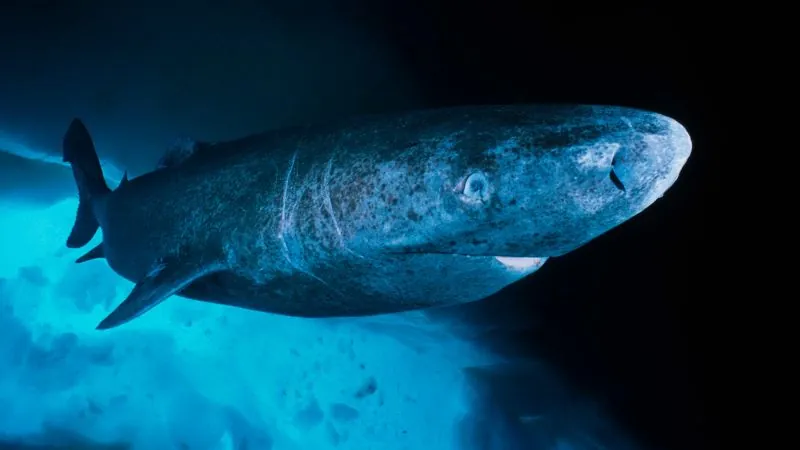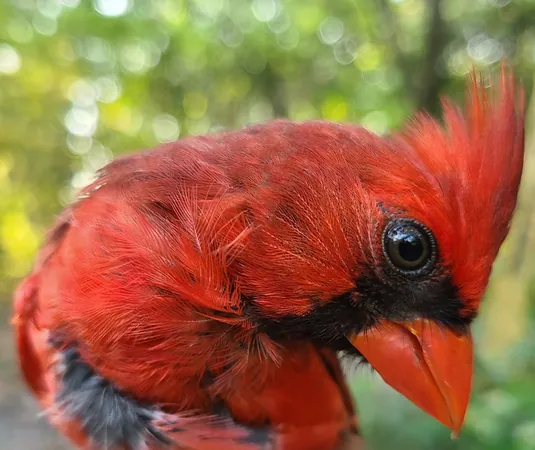
Decoding the Ancient Secrets of Greenland Sharks: The Key to 400-Year Lifespans?
2024-12-13
Author: Charlotte
The Greenland shark has spent centuries swimming through the frigid depths of the North Atlantic and Arctic oceans, effectively remaining one of nature’s best-kept secrets. These mysterious creatures, known for their lethargic lifestyle and remarkable adaptability to icy waters, may hold vital clues to longevity that stretch back to colonial times. Recent research has begun revealing the astonishing traits of these sharks, including the possibility that they can live for up to 400 years or more—a lifespan that makes them the longest-living vertebrates on the planet.
For years, scientists speculated about the Greenland shark's impressive lifespan due to its slow metabolism, which hinders rapid aging. However, it wasn't until a groundbreaking study published in 2016 that researchers confirmed their suspicions: these sharks can live anywhere from 272 to over 500 years. This astonishing longevity is now drawing further investigation as scientists seek to understand the genetic mechanisms that enable these creatures to defy the odds of aging.
In a collaborative effort, an international team of researchers has successfully mapped the genome of the Greenland shark. By sequencing around 92% of its DNA, the study sheds light on the intricate genetic architecture that likely contributes to the shark's remarkable lifespan. “The genome assembly is a tool that helps us delve into the molecular mechanisms underpinning longevity,” explained Dr. Steve Hoffman, a computational biologist leading the research.
This extensive genome is noteworthy—not only is it twice as long as that of a human, but it also surpasses any other shark genome sequenced to date. By examining the large size and peculiar features of the genome, researchers speculate that enhanced DNA repair capabilities may help the Greenland shark combat age-related damage. Notably, over 70% of the shark's genome is composed of "jumping genes," which can duplicate themselves and sometimes cause mutations. Surprisingly, it seems that in these sharks, the ability of genes responsible for DNA repair has evolved in such a way that they act as "jumping genes." This might allow them to effectively counters the negative effects typically associated with genetic duplication.
Interestingly, the Greenland shark's slow growth rate, which is less than 1 centimeter (0.4 inches) per year, means they don't reach sexual maturity until they’re around 100 years old. These attributes imply that such a unique evolutionary strategy could provide essential insights into human aging and longevity. As researchers continue their investigations, they hope to correlate discoveries from the Greenland shark genome with other long-lived species, including naked mole rats and tortoises, which also exhibit extraordinary lifespans.
Dr. Nicole Phillips, an associate professor of ecology, emphasizes the importance of sequencing high-quality genomes: "With more genomes, we enhance our comprehension of the genetic foundations of various unique traits within these ancient groups of animals." The potential to glean insights into the biology of aging could not only shed light on extraordinary species but also open doors for breakthroughs in human longevity.
Despite their elusive nature, the Greenland shark faces threats from climate change and fishing, prompting calls for conservation efforts. Moreover, researchers hope that their genomic discoveries will aid in the preservation of this ancient species, which is currently listed as vulnerable on the International Union for Conservation of Nature’s Red List.
As scientists continue exploring the genetic enigmas presented by the Greenland shark, the implications extend beyond zoology. With the possibility of translating these findings into practical applications, such as developing therapies aimed at improving human DNA repair mechanisms, the quest for longevity insights might lead to more than impressive statistics about fish longevity—it could very well help redefine what it means to age gracefully while staying healthy.
In summary, the Greenland shark is not just an ancient marine marvel; it’s a living archive of evolution that could hold the ultimate secrets to extending life itself. As our understanding deepens, who knows? We might just find a way to unlock the secrets of longevity reverberating through the depths of the ocean.









 Brasil (PT)
Brasil (PT)
 Canada (EN)
Canada (EN)
 Chile (ES)
Chile (ES)
 España (ES)
España (ES)
 France (FR)
France (FR)
 Hong Kong (EN)
Hong Kong (EN)
 Italia (IT)
Italia (IT)
 日本 (JA)
日本 (JA)
 Magyarország (HU)
Magyarország (HU)
 Norge (NO)
Norge (NO)
 Polska (PL)
Polska (PL)
 Schweiz (DE)
Schweiz (DE)
 Singapore (EN)
Singapore (EN)
 Sverige (SV)
Sverige (SV)
 Suomi (FI)
Suomi (FI)
 Türkiye (TR)
Türkiye (TR)